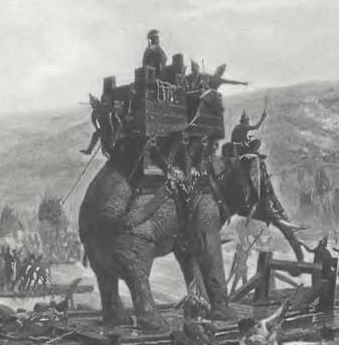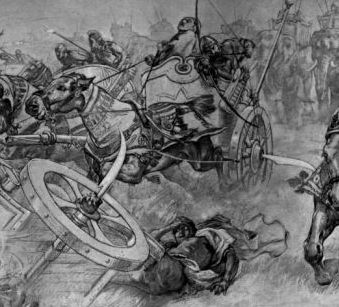Dave Hardy‘s part of the seminar was probably my favorite. For those that don’t know Dave, he’s full of great lawyer stories, and is a very good story teller. His presentation was on “Presumptively Lawful” restrictions on the Right to Keep and Bear Arms after Heller. As part of the presentation he covered the “Dangerous and Unusual” language present in that case as well. What kind of weapons might be “Dangerous and Unusual?” Certainly any weapon is potentially dangerous, and many weapons are unusual? Dave suggested that this is rooted in the common law prohibition against “going armed, with dangerous or unusual weapons, is a crime against the public peace, and terrifying the good people of the land.” But as Dave noted, this was a prohibition on “going armed,” not against possession in the home. So, in the examples he pointed out as what might constitute dangerous or unusual weapons under this standard?
One could imagine a Carthaginian War Elephant would be among the kinds of weapons that would terrorize the King’s good subjects, Or perhaps this:
Or if the war elephant isn’t dangerous and unusual enough, perhaps driving a War Chariot up and down the streets of a major city would produce sufficient terror that it might be prohibited. And of course, this would only be a prohibition against public use, you can keep all the Carthaginian war elephants at your home that you want.
Dave is a character, and I appreciate his insertion of humor into his presentation. Hardy also gave the presentation for Lunch, talking about how the movement started from nothing in the 70s, and built its way to the present day. The exciting thing about that, was that virtually all the major players were present in the room. The success we’ve had over the past several years isn’t any accident. It rests on the shoulders of giants, many of whom are unsung heroes, Dave being among them, in addition to Halbrook, Don Kates who were also in the room, and many others who were not. I am honored to have attended a seminar with such high caliber people.



The very best speakers use humor effectively … one day I may get to see him.
So his point about ‘going armed’ with an ‘unusual’ weapon makes repealing the Hughes amendment something the ILA is considering?
‘Cuz if I can have and shoot a class III weapon, I really don’t care if I can carry it around.
I would think a “dangerous & unusual weapon” would be something like using an RPG or flamethrower for personal defense. Maybe even a .50 BMG weapon; or hand grenades. The point being that the effect of the weapon far exceeds the intent of its use; it virtually insures collateral damage.
I would think that in pretty much all cases with a handgun or a rifle or a shotgun the intended damage is basically a single point.
Now, I’m of the opinion that folks should be allowed to have RPGs, flamethrowers, and hand grenades, but there are consequences to their use & ownership, and I think people should be held accountable for that, like grown ups. Still, even I think hurling off a shaped charge rocket at a burglar is pretty knuckle-headed.
The Packetman Said: So his point about ‘going armed’ with an ‘unusual’ weapon makes repealing the Hughes amendment something the ILA is considering?
Wow. I’d call that a leap AND a bound.
Well, Carl …..no, it was more of a good-natured poke at Sebastian than anything. Sebastian maintains that the NRA cares about class III weapons; I assert that they don’t (the recent AL SBR victory not withstanding), and I’m hardly alone.
So given that Dave Hardy pointing out that the ‘dangerous and unusual’ language in the Heller decision roughly corresponds to the common law prohibition of carrying ‘dangerous and unusual’ weapons in public, along with the example of the Carthaginian War Elephant as a ‘dangerous and unusual’ weapon that one would be allowed to own, but not carry in public, i think my question is extremely relevant.
Since all of the class III owners I know of use their weapons on their own property or at approved ranges, Mr Hardy’s examples would represent the norm for class III owners, ie, nothing would change.
So again I ask, is the repeal of the Hughes amendment something the ILA is considering?
I believe citizens should be able to own anything government agents (including soldiers) may own, up to but NOT including nuclear, biological or chemical weapons.
Remember that the battles of Lexington and Concord were fought to prevent British soldiers from confiscating and destroying cannons, for which the modern-day equivalent would be artillery pieces.
We do not have the votes in Congress to repeal the Hughes Amendment. As long as that’s the case, we’re stuck with it.
Oh great, now we’re going to have an inevitable debate over whether it’s better to have a few high-caliber people or to have more people of lesser skills. And then someone’s going to chime in with the importance of shot placement and training.
Packetman, I called your question a leap and a bound because you implied that because David Hardy discussed a potentially related topic, the NRA-ILA is (or should, or even might) be working to repeal Hughes.
That was the leap. Hardy isn’t a mouthpiece for the NRA.
I feel Hughes should be repealed. I believe the NRA feels is should be repealed. But have you ever heard of something called choosing battles? There are bigger, more politically feasible fish to fry at the moment. Repealing bad laws takes time, money, and political capital. It makes much more sense to systematically knock off low-lying fruit. Hughes is high fruit.
I mean, for goodness sake. There still exist places in the US where citizens cannot own defensive handguns, or semiauto firearms, and many places where citizens can’t even carry arms for personal protection.
Your glass is indeed half full.
“You can have my Carthaginian War Elephant when you pry it from my cold dead fingers” just doesn’t have the same ring to it…
MMMM. War Chariots.
http://www.dailymotion.com/video/x1ee8d_motorized-chariots-racing_auto
:-)
I have a question.
What is a ‘type’ of arms?
As in, how narrow a category of arms can be circumscribed to be ‘unusual’?
It’s clear machineguns are a ‘type’ of arms.
But can legislators, for example, decide that a given caliber pistols (say .50AE) are not commonly used, and ban those, even as self-loading pistols are very usual?